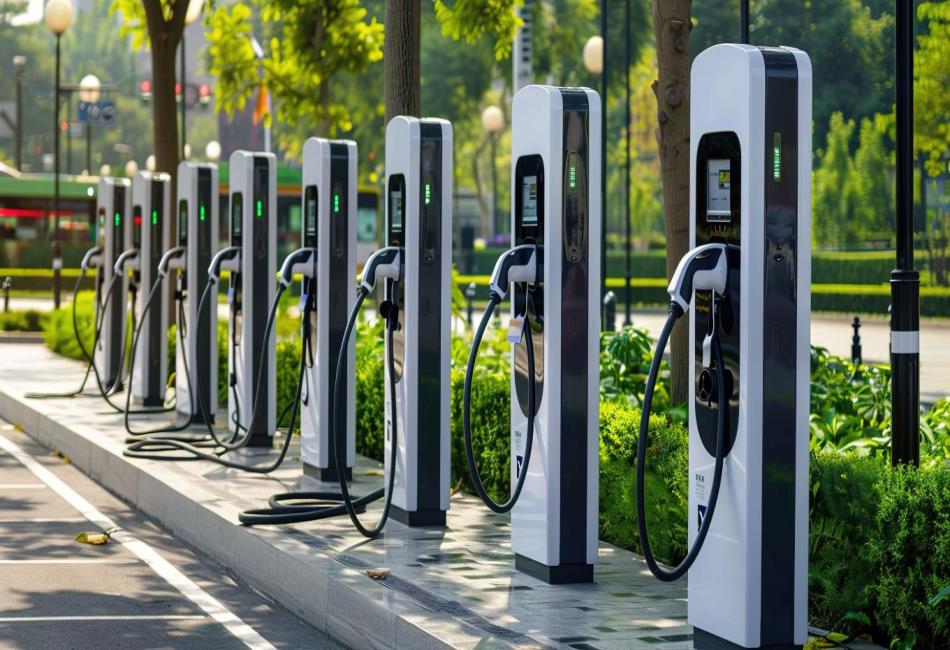Table of Contents
- Introduction to Smart EV Charging
- Benefits of Smart EV Charging
- How Smart Charging Works
- Technological Advancements in EV Charging
- Smart Charging and Energy Grid Management
- Real-World Applications
- Future Outlook
- Resources
Key Takeaways
- Innovative charging solutions are crucial for a sustainable future with electric vehicles (EVs).
- Technological advancements are making EV charging more efficient and accessible.
- Understanding the benefits of smart EV charging helps consumers and city planners enhance their infrastructure.
Introduction to Smart EV Charging
The shift towards electric vehicles (EVs) is essential for addressing today’s urgent environmental issues. With vehicle emissions being one of the most significant contributors to air pollution, shifting to EVs is crucial for reducing our carbon footprint. However, the mass adoption of EVs comes with challenges, particularly in managing their charging needs sustainably. This is where the concept of innovative EV charging solutions comes into play. With advanced technology and strategic planning, platforms like Delta’s EV solutions are rising to the occasion, providing creative alternatives to traditional charging methods. These solutions are about enhancing consumer convenience, integrating renewable energy sources effectively, and playing a significant role in creating sustainable urban infrastructures.
Benefits of Smart EV Charging
Smart EV charging systems offer many benefits beyond just saving money on electricity bills. They are designed to optimize energy consumption patterns, making the process as efficient as possible. By scheduling charging during off-peak hours, users enjoy lower electricity rates and contribute to a more stable energy grid. In addition to cost savings, this approach helps reduce the carbon emissions that occur when energy demand and production are not aligned. Intelligent charging systems enhance the incorporation of renewable energy sources, including solar and wind power, into conventional charging infrastructures. This advancement promotes electric vehicles’ sustainability and aligns with energy efficiency and conservation objectives.
How Smart Charging Works
The magic behind smart charging lies in its sophisticated use of data and communication technology. These systems utilize advanced algorithms to determine the most efficient times to charge your vehicle by assessing current and projected grid loads, the availability of renewable energy, and user-specific preferences. This analytical approach guarantees optimal energy consumption and enables users to make well-informed choices regarding the timing and method of charging their vehicles. For instance, users might prefer charging their cars using solar power generated during the day, thus further reducing their carbon footprint. This level of customization is what sets smart charging apart, making it a game-changer in the realm of sustainable transportation.
Technological Advancements in EV Charging
The field of EV charging has witnessed astounding technological advancements in recent years, dramatically altering how we think about and utilize electric power. According to Scientific American, innovations such as Internet of Things (IoT) integration, AI-based systems for predictive maintenance, and user-centric interfaces are just a few breakthroughs reshaping the industry. These developments ensure faster charging times and more reliable service, making electric vehicles an increasingly attractive option for everyday consumers. Moreover, IoT-enabled charging stations offer real-time data analytics, providing insights into usage patterns and energy consumption that can help further optimize grid management and reduce overall costs.
Smart Charging and Energy Grid Management
One of the most significant benefits of smart EV charging lies in its ability to support and enhance energy grid management. As grids are tasked with accommodating more electric vehicles, the risk of overloads and inefficiencies increases. However, smart charging solutions offer a strategy to mitigate these risks by enabling real-time communication with the energy grid. This allows for adaptive load balancing, effectively distributing the demand for power across different times of day to prevent overloads. Grid communication enhances the resilience of the energy grid and enables the seamless integration of renewable energy sources. This approach is essential for maintaining an efficient and eco-friendly energy system.
Real-World Applications
Cities around the globe are awakening to the immense promise of innovative electric vehicle (EV) charging systems, actively weaving them into the fabric of their urban infrastructure. These advanced systems are not merely a concept; they are becoming a reality, with real-world applications already yielding transformative results. In urban areas that have embraced intelligent charging setups, residents are enjoying the benefits of reduced traffic congestion, which makes daily commutes smoother and less stressful. Additionally, these innovations have led to noticeable improvements in air quality, creating healthier and more enjoyable living environments.
Moreover, introducing smart charging stations is a crucial step toward realizing smart cities—urban centers where energy efficiency and sustainability take precedence. By strategically placing these intelligent charging stations in public areas, workplaces, and residential neighborhoods, cities are reshaping their landscapes and fostering a culture of eco-friendliness. This initiative contributes to a greener future and promotes the widespread adoption of electric vehicles among residents, embodying a collective commitment to innovation and environmental stewardship.
Future Outlook
The future for innovative EV charging solutions is auspicious and full of potential. As initiatives to reduce carbon emissions gain momentum worldwide, investments in smart infrastructure are expected to surge. Governments and private sectors are expected to collaborate more closely to accelerate developing and deploying advanced innovative charging ecosystems. The anticipated growth will support the extensive adoption of electric vehicles and encourage the incorporation of additional renewable energy sources into the energy grid. Furthermore, it will facilitate real-time, data-informed decision-making that optimizes energy utilization efficiency. As these developments progress, we can expect a future in which smart electric vehicle charging becomes standard, propelling us toward a cleaner and more sustainable environment.
